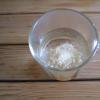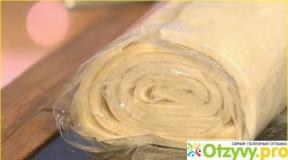Sunflower oil - composition, medicinal and beneficial properties, benefits and harms. Application
For many years, sunflower oil has remained the most popular and demanded among the population. Up to 70% of vegetable oil produced in our country falls on the share of sunflower oil. The oil is made from sunflower seeds, which are grown in large quantities in many countries, due to the cheapness of raw materials and low production costs, this vegetable oil is one of the most affordable.
Refined sunflower oil contains few nutrients and is used for frying.
Unrefined oil
It is unrefined oil that is considered the most useful, since it retains all the beneficial substances of sunflower seeds. Unrefined sunflower oil is produced by cold and hot methods.
In the first method, sunflower seeds are cold pressed, the oil is filtered and no further processing is applied. Such a product is considered the most useful, but its shelf life is very short. The oil has a dark rich color, a characteristic aroma, sediment is allowed.
The second method for making unrefined sunflower oil is hot pressing. Before pressing, the sunflower seeds are heated, after pressing, physical methods of oil refining (filtration, centrifugation, "freezing") can be used, but no chemicals are used. The oil becomes more transparent, but this practically does not affect its taste and useful properties.
In no case should unrefined sunflower oil be used for frying; during heat treatment, it loses all its beneficial properties and becomes very harmful to the body.
Refined oil
Refined oil is obtained by extraction, sunflower seeds are filled with an organic solvent, which is removed after the oil is isolated. After such a process, sunflower oil becomes transparent, light yellow in color, it has practically no smell, but there is no taste, and there is very little benefit in it. Such a product can be used for frying food, but it should not be overused.
The benefits of sunflower oil
The amount of nutrients contained in sunflower oil can vary depending on the place and conditions of sunflower growing and the method of processing. But in any case, this product is rich in vitamins E (it is most of all in this oil), A, D, group B, trace elements, inulin, tannins, as well as fatty acids, the main part of which is represented by unsaturated fatty acids. This vegetable oil cannot be distinguished by anything, in terms of the amount of useful substances, although there are not enough of these substances in it. But the low price makes it one of the most affordable lean products, which undoubtedly have a positive effect on human health.
Sunflower oil has a complex beneficial effect on the entire body (recall that we are talking about unrefined oil).
The complex of unsaturated fatty acids, united by one term - vitamin F (by the way, it is not synthesized in the human body) is necessary for the body for normal fat metabolism. With the intake of a sufficient amount of this vitamin, lipid metabolism improves, the level of "harmful" cholesterol in the blood decreases, the metabolism of fats improves, due to which sunflower oil helps in the fight against excess weight.
Sunflower oil has a mild laxative effect, helps to improve digestion and the biliary system, that is, it helps to establish the process of natural cleansing of the body. Good functioning of the digestive system has a beneficial effect on the functioning of the whole organism and is reflected in the appearance.
Vitamin-mineral complex and inulin help to strengthen the immune system. Vitamin E, which is a powerful antioxidant, protects the cells of the body from premature aging, has an antitumor effect, and helps to improve the condition of the skin and hair. The use of unrefined sunflower oil has a positive effect on the state of the nervous system.
In the composition of industrial cosmetics, you rarely find sunflower oil, but there are many popular recipes for skin and body care. It is used as a base for nourishing and moisturizing face masks, scrubs and body wraps.
Vegetable oil is a popular product used by housewives all over the world in cooking for salads, soups, frying, stewing and canning. How sunflower oil is obtained, what are the unique properties of this useful product, what are the benefits and harms of unrefined oil - these are the range of issues that will be discussed in this article.
What is sunflower oil
The vegetable oil obtained from the seeds of the oilseed sunflower is called sunflower oil. It is extracted from ripe sunflower seeds, and is widely used in cooking, industrial canning, soap making, paint and varnish production, pharmaceutical, cosmetic production (it is part of various ointments, creams). The industrial method of pressing sunflower seeds was invented in 1829, since then it has been the most popular Russian oil product.
Compound
The main beneficial component of the chemical composition of sunflower oil is omega fatty acids. This type of vegetable oil product is an almost irreplaceable source of vegetable fats: saturated fatty, unsaturated fatty (oleic acid) and polyunsaturated fatty acids (linoleic acid, linolenic acid) - vitamin F. In addition, the product is saturated with vitamins D, A and E. Energy value (calorie content) - 899 kcal. The content of all substances per 100 g of product is shown in the table below:
Kinds
There are several types of classification of vegetable oils, including sunflower oil. There are types of product according to the method of production (type of pressing) - cold (the greatest benefit), hot pressing, and obtained by the extraction method. The following types of sunflower oil, which have undergone different refining methods, are widespread:
- unrefined sunflower (rough mechanical cleaning; has a sharp specific smell);
- hydrated (purified with hot water);
- refined (additionally refined after mechanical cleaning);
- deodorized (deodorization - steam treatment under vacuum).
To answer the question of which vegetable oil is better to buy, you need to understand which method of cleaning in the product retains a greater amount of nutrients. After passing through several stages of purification, the nutritional properties of sunflower oil are reduced, therefore the most useful is the unrefined cold-pressed oil product, which retains the maximum percentage of polyunsaturated fatty acids.
How do
The process of making a product begins with cleaning and crushing sunflower seeds. The higher the moisture content and the degree of ripening of raw seeds, the more product is obtained in the output. Before squeezing the seeds, a pulp or mint is obtained from them. Then, by pressing or extracting (separating the mixture obtained by a chemical method into an oil product and miscella), oil is isolated from this mass. During subsequent refining, it is additionally purified using hot water.
Application
A vegetable oil product from sunflower is one of the most popular Russian dressings, which is widely used for preparing a variety of dishes, for dressing salads. However, cooking is not the only area of its application. Due to its high oleic composition, the product is used in the production of cosmetics, added to ointments and creams. They also use it in its natural form - in the process of treating a number of diseases and promoting health. Traditional healers recommend drinking a tablespoon of the oil product in the morning on an empty stomach to improve digestion.

The benefits of sunflower oil
Sunflower seeds contain vitamins and a number of essential trace elements such as phosphorus. The benefits of sunflower oil for the body lie in the high content of polyunsaturated fatty acids, which normalize metabolic and reproductive processes, improve the condition of the skin and hair, strengthen the vascular walls, and activate the immune system.
Refined
High-quality refined deodorized oil is widely used for frying, it is considered a more dietary product with a lower cholesterol content. In cooking, it is used mainly for frying and preserving dishes, transparent, does not have a pronounced odor, does not contain sediment, it is perfectly stored for a period of one to three months.
Unrefined
This type of sunflower seed pressing gives a product that retains the maximum amount of their original beneficial properties. Therefore, the use of this type is useful for:
- strengthening cell membranes and vascular walls;
- normalization of the digestive system;
- improving the work of the endocrine and genitourinary system;
- strengthening the skin and hair growth.
Cold pressed
With cold pressing technology, the beneficial and medicinal properties of the oil product are best preserved. Therefore, it is used for most recipes of traditional medicine and in cosmetology, as part of masks for hair, face and hands. Such a product perfectly moisturizes dry skin, making it more elastic, activates healing and natural renewal of epithelial cells.

Frozen
Freezing technology removes waxy impurities from the oil product, thereby increasing transparency. The frozen sunflower oil product is recommended for people on a dietary regime, since the content of harmful impurities in it is minimal. Vegetables are fried and stewed on it, added to light desserts and baked goods.
Sunflower oil treatment
The beneficial properties of sunflower oil (unrefined, obtained by cold pressing) are widely used in folk medicine. The simplest and most effective method of strengthening the overall health of the body is to suck on a sunflower oil product in the morning on an empty stomach. The oral cavity is the place where a large number of nerve endings are concentrated, plus due to contact with the salivary glands, the best absorption of the drug occurs. Put a dessert spoon of oil in your mouth, roll it over the entire cavity for 1.5-2 minutes without swallowing.
To strengthen immunity, it is good to give a teaspoon of sunflower oil product to children in the morning (this method is especially relevant for the cold season). Unrefined sunflower oil is added to herbal infusions used in the treatment of constipation, liver and kidney diseases, and cholelithiasis. For example, a tincture with oregano (3 tablespoons of herbs per 0.5 liters of oil product) is taken to relieve pain in stomach ulcers.
Sunflower oil in cosmetology
The use of vegetable oil for moisturizing the skin and improving its condition lies in its high content of fatty acids. The simplest face mask is easy to prepare by mixing:
- unrefined sunflower oil - 15 g;
- steamed oatmeal - 10 g;
- large strawberries - 5 pcs.
Apply the mixture to your face, keep it dry. After several applications, the skin of the face will be cleansed, tightened, become more elastic, and will acquire a fresh, healthy look. A different recipe is used for the hands:
- fat cottage cheese - 100 g;
- unrefined sunflower oil - 1 teaspoon
Rub cottage cheese with an oil product, apply on clean, dry skin of your hands for 7-10 minutes. Do the mask once a week. To strengthen and stimulate nail growth, keep your fingertips for two to three minutes three times a week in a mixture of sunflower oil product and lemon juice in a 1: 5 ratio. The same mixture can be applied to the hair roots to accelerate growth, reduce the percentage of hair loss.
Sunflower oil harm
Use only fresh product so as not to harm the body by consuming pomace from the seeds of any sunflower varieties. Check the expiration date upon purchase, pay attention to transparency, absence of sediment or impurities. Store unrefined oil in glass containers; observe the maximum shelf life of an opened bottle - no more than 30 days.

Sunflower oil contraindications
Vegetable oil products should be used with caution for people suffering from high cholesterol levels, as well as:
- patients with diabetes mellitus;
- with diseases of the liver and kidneys;
- with allergies to sunflower seeds, products of their processing.
Video
Hello everyone!
Traditionally and due to geographical features, sunflower oil is the main oil in our kitchens. With its help, we indulge homemade ruddy fried potatoes, juicy cutlets and lush pastries. And this despite the fact that nutritionists do not recommend getting too carried away with fried food, and if you do fry, then replace sunflower oil with olive oil.
This raises the question of whether sunflower oil is so useful, and if so, how to use it in order to extract this benefit.
Beneficial Essence of Sunflower Oil
Obtained from sunflower seeds by pressure, the oil is a product containing 99.9% fat. Another thing is that the fat presented in sunflower oil is extremely beneficial for health, since it consists of fatty acids that have a lot of useful functions.
Of greatest interest is linoleic acid, which is up to 62% in the product.
It belongs to the class of essential omega 6 fatty acids, which our body is not able to synthesize, and must be obtained from food, since they are extremely necessary for its proper functioning.
Omega 6 is involved in the production of prostaglandins, which in turn improve blood circulation, prevent thrombosis and inflammatory diseases.
Omega 6
- participates in the formation of cell membranes and a number of hormones;
- ensures the correct functioning of the immune system;
- improves visual acuity;
- regulates the course of inflammatory processes;
- and also contributes to the proper functioning of neurons and chemical bonds between cells of the nervous system.
Due to the presence of linoleic acid, sunflower oil is extremely useful:
- for the health of the heart muscle;
- with atherosclerosis, since it drains cholesterol plugs on the inner walls of the arteries;
- to prevent impotence and female diseases, such as mastopathy
- with arthritis;
- hair loss and skin problems.
It's all about balance
The only drawback of omega 6 is its opposition to another type of essential fatty acid omega 3. Simply put, excess omega 6 interferes with the metabolism of omega 3, harming the cerebral cortex and nervous system of our body. If we use a diet rich in omega 3 acids, then they contribute to the rapid release of omega 6 from food and increase the therapeutic effect of these acids (antithrombotic, antiarrhythmic and vasodilatory).
The recommended balance between omega 6 and omega 3 acids should be 4: 1. And since sunflower oil contains less than 1% omega 3 essential fatty acids, it should be mixed with olive or flaxseed oil, as well as nuts, cucumber grass, and any other foods rich in omega 3.
What else is rich in the composition of sunflower oil?
Unrefined sunflower oil is a source of vitamin E with properties. This vitamin not only protects cells from the influence of free radicals, but also prevents their degenerative changes. Indispensable for the skin, as well as heart health, proper blood circulation, in the treatment of angina and atherosclerosis.
In the percentage of vitamin E, sunflower oil is superior. In order to provide the body with a daily dose of this vitamin, you will need either 2 tablespoons of sunflower or 10 olive oil.
The combined effect of vitamin E and linoleic acid provides sunflower oil with a rejuvenating effect on the skin. It forms a special protective layer on the skin to retain moisture, provide nourishing as well as protective anti-inflammatory function.
Is it possible to fry in sunflower oil
On sale you can find 2 types of oil:
- refined, absolutely useless for health;
- pressed or natural, obtained by cold pressing, it retains all the useful properties.
However, in order for the body to use them, the oil should not be exposed to high temperatures, at least this destroys vitamin E, and also ensures the formation of substances harmful to health. It is better to fry in olive oil, which contains a high percentage of oleic acid, and natural sunflower oil is ideal for salads and homemade mayonnaise. For frying, you can also use refined, provided that
- the heating temperature will not be higher than 170 degrees;
- oil does not smoke in a frying pan;
- you allow reuse more than 2 times;
- do not fry in darkened oil;
- remove ice pieces when frying foods that are recommended to be cooked without defrosting, as in addition to "shooting" and splashing, this is very harmful to the quality of the oil.
Useful properties and contraindications of sunflower oil
 |
- Against cough- Stir 5 drops of eucalyptus and thyme oil with two tablespoons of sunflower oil, rub the mixture on the chest and back twice a day.
- From ear pain- crush a large clove of garlic and pour over it with sunflower oil, leave for 24 hours, then strain, pour into a bottle and warm slightly in your hands so that the resulting mixture is at body temperature. Apply two drops to a cotton swab and cover your ears.
- Sore throat and the lost voice drink two tablespoons of oil a day.
- Hand cream. Melt 2 tablespoons of lanolin in a water bath, add the same amount of sunflower oil to it, beat until the mixture is completely cool. Place in a glass, hermetically sealed bottle, use as a night cream to soften the skin of the hands.
- For shine hair. Add 2 tablespoons of sunflower oil (for 300 ml of shampoo) to any shampoo you use. Wash your hair first with a regular shampoo and then with an oil shampoo. Especially useful for colored dull hair.
- With varicose veins To prevent blood clots for people with varicose veins, eat 2 tablespoons of sunflower seeds a day.
- Gastritis It is useful to add sunflower oil for gastritis to salads, drink on an empty stomach, and also make herbal oil infusions on its basis.
- For constipation. It is useful to cook dishes with the addition of sunflower oil - salads, vinaigrette.
Sunflower oil contraindications
The main contraindication is the abuse of vegetable oil, the daily dose should not exceed 2 tablespoons per day. This is especially true for people suffering from increased obesity and diabetes.
Excess fat can increase blood sugar and insulin levels. It should also not be consumed by people with sunflower allergies, which is extremely rare. For the rest, in reasonable doses, sunflower oil will only be useful, as a base oil for massage and aromatherapy, a natural medicine and a delicious ingredient in homemade dishes.
The controversy around the issue and the benefits of sunflower oil does not stop. Some are in a hurry to assure that refined oil is very harmful to health. Others are reluctant to buy unrefined because it often has a bitter taste and foams in the pan. There are opinions that just refined oil is able to withstand high temperatures, and natural (not refined), on the contrary, is suitable only for dressing salads. Where to find the truth, and which sunflower oil to choose. The benefits and harms of this product will be discussed in our today's article so that you can make your choice.
The benefits of sunflower oil
To begin with, it is one of the most popular foods used in cooking. Not a single kitchen is complete without its use; every housewife always keeps sunflower oil in a darkened cabinet. Its benefits and harms depend on the method of use, because the product itself is very valuable. It contains vitamins A, D, E, as well as many biologically active substances. Eating this product helps to improve vision, strengthen bones, hair, nails and skin. Sunflower oil has a beneficial effect on the endocrine and genitourinary system. The oil is capable of preserving many vitamins. For example, carotene in carrots only dissolves when consumed with oil.
Oil is also widely used in cosmetology. Almost all oils that are in pharmacies (burdock, St. John's wort, nettle and many others) are prepared on its basis. As you can see, sunflower oil is a very valuable product. Its benefits and harms, however, go hand in hand.

Sunflower oil harm
This is obvious, but one cannot but mention it. The product is very high in calories, and a large amount of fat in the composition can cause excess weight gain. Oil should be eaten in moderation. This is especially true for those who are obese. That is, in fact, all the harm that a person can get from this product is that it is high in calories. Therefore, you cannot use it in too large quantities. At the same time, dressing salads, you will not harm your body. However, anything fried in oil should be kept to a minimum.
Contraindications
Despite the fact that this is a product, and not a medicine, sunflower oil has its own contraindications. The benefits and harms of it have already been described, now let's see for whom this product is completely banned. These are primarily people suffering from cardiovascular diseases. If you have diseases of the biliary tract and gallbladder, then you should minimize the intake of oil. In addition, in minimal amounts, sunflower oil should be taken for diabetes and high cholesterol levels.

The benefits of refined oil
You will always recognize this product by its characteristic characteristics - it is a light color, no smell and no smoke when frying. Therefore, more often than not, if you plan to cook pies or tortillas, then take just refined sunflower oil. The benefits and harms of this product are determined by the technologies by which it was purified. The composition of the product remains the same; the cleaning procedure does not change it. It is carried out in two ways. The first - physical, involves the use of adsorbents. The second is chemical, in this case the oil is passed through alkalis. The second method is more common, since it is easier to control the quality of the final product.
First of all, we can appreciate the advantage of refined oil when frying. It does not taste, smoke or foam. Nevertheless, you should not strongly discard the pan. The smoke point, when the oil starts to burn, forming carcinogens, is higher in the refined oil, but it still exists.

The harm of refined oil
In some cases, if you want to get an odorless product, you should use frozen sunflower oil. The benefits and harms of this product are little known, however, it can be assumed that you get a purified, odorless product without using any alkalis and absorbent substances. Manufacturers of course claim that the oil is washed well after cleaning and no harmful impurities are retained in it. Believe it or not, the home cleaning process is much safer. For example, do not use factory-refined sunflower oil on an empty stomach. The benefits and harms of such a product depend on how it is purified. No matter how safe industrial alkalis are, their impurities are unlikely to add to your health.

Benefits of unrefined oil
Now let's take a look at unrefined sunflower oil. For a long time, its benefits and harms were not considered at all, it was written down in cheap products for the poorest, and everyone else used purified food. However, this is fundamentally wrong. Cold-pressed oil is the very best you can think of for your health. It retains the maximum of nutrients found in sunflower seeds. It is it that is very useful for dressing vegetable salads, you can drink it on an empty stomach in the morning, as well as arrange for rinsing your mouth with sunflower oil. The benefits and harms of this ritual have been studied since antiquity. So they treat a sore throat, sore throat, relieve headaches and toothaches. To do this, a little oil is taken into the mouth and rinsed for 20 minutes, after which it is supposed to spit out the oil.
This lean food product has been used since ancient times as a substitute for animal fats during fasting, or during illness. Dough was made in vegetable oil, lean pies were baked, and it was added to cereals.

Harm of unrefined oil
When frying, unrefined oil does more harm than good. When heating starts, excess moisture in the oil rises, and this immediately leads to the appearance of foam. It is very difficult to control the frying process when the products are covered with a thick layer of foam. Natural oil starts to smoke already at 100 degrees, considering that the average frying temperature of pies is 230 degrees, it is clear that the formation of carcinogens is inevitable.
This means that if you decide to fry the meat in fragrant oil, you will hopelessly ruin the product as a result, and the whole room will have to be ventilated for a very long time. The smell after frying in unrefined oil is very persistent. Nutritionists unanimously argue that, despite the high calorie content, vegetable oil should be present in the diet regularly. At the same time, it is better to take peeled for frying, and unrefined for making sauces and dressing salads. Therefore, you should always have two bottles of oil in your kitchen.

Let's summarize
Today we covered an important topic, since each of us constantly buys sunflower oil. The benefits and harms (we discussed in detail how to take refined and natural oil earlier) of this product very much depend on how you use it. First of all, you need to observe the dosage, every day it is permissible to use only 2 tablespoons, due to its high calorie content. In addition, in order not to get harmful carcinogens with food, you need to remember that you can only fry in refined oil. But for salads and sandwiches, you can use fragrant, unrefined seeds smelling of seeds.
There is sunflower oil in the kitchen in almost every home. It is used for frying meat, vegetables, pies, making salads. At the same time, no one even thinks about the fact that sunflower oil, the composition of which is rich in useful substances, can be used not only in the cooking process, but also in the treatment of various ailments, eliminating some of the defects in appearance.
A bit of history
Sunflower oil is a product that is obtained from sunflower seeds. This plant was brought from America to Europe. It appeared in our country thanks to Peter I. The Tsar noticed this beautiful plant in Holland and ordered to bring seeds. The sunflower has long been considered an ornamental flower. At the end of the 18th century, Academician V.M.Severgin wrote in his writings that oil can be obtained from seeds. However, this information did not generate widespread interest.
Until about the 30s of the 19th century, the sunflower was a garden plant. Then the peasant D. Bokarev decided to squeeze the oil out of the grains. The experiment was successful. The resulting product was delicious and served as an alternative to other vegetable oils. Gradually, sunflower has become the most cultivated in the country.
Sunflower oil composition
The product in question includes useful substances:
- which are more easily assimilated by the human body in comparison with animals;
- vitamin E, which protects against aging and cancer;
- fatty acids necessary for the body to build cells and tissues, for the functioning of the circulatory and nervous systems.
You can find out what sunflower oil includes from the table below. The composition is indicated per 100 g of the product.
| Chemical composition and nutritional value | |
| Water | 0,10% |
| Fats | 99,90% |
| Saturated fatty acids | 12,5% (8,7%—16,3%) |
| Polyunsaturated fatty acids | 65,0% (55,0%—75,0%) |
| Phosphorus | 2 mg% |
| Vitamin E | 44 mg% |
| The energy value | 899 kcal |
| Fatty acid composition: fatty acids (%, to the amount of fatty acids) | |
| Myristic | up to 0.02 |
| Palmitic | 5,0—7,6 |
| Lignoceric | up to 0.5 |
| Palmitoleic | up to 0.3 |
| Arachinic | up to 0.5 |
| Oleinovaya | 14,0—39,4 |
| Linoleic | 48,3—77,0 |
| Linolenic | up to 0.3 |
| Stearic | 2,7—6.5 |
| Behenic | 0,3—1,5 |
| Gondoin | up to 0.3 |

Sunflower oil classification
Vegetable oil made from sunflower seeds is categorized as unrefined and refined. The initial product, after receiving from the raw material, is defended, filtered and sent for hydration and neutralization. During these procedures, the composition of unrefined sunflower oil is deprived of phospholipids - substances that make the oil cloudy during prolonged storage.
The second product from the classification is obtained after passing through the complete purification technological scheme. The sunflower oil is defended, filtered, centrifuged, and hydrated. The next process after all this is refining. Sunflower oil is clarified with special adsorbents. Then the product is processed under vacuum with water vapor. Due to this, the oil loses its original smell, i.e., deodorizes. The treatment also removes substances that, when exposed to high temperatures, turn into carcinogens and enter the body.

Healing properties of the product
Sunflower oil is necessary for the human body, because it contains useful substances. In particular, it is rich in vitamin E. In other vegetable oils, it is contained in much smaller quantities (if you compare the composition of olive and sunflower oil, you can see that the latter contains 10 times more of this vitamin). It is necessary for the normal functioning of the heart muscle, gonads. With its lack, neurological disorders occur, hemolysis of erythrocytes. To prevent such conditions, it is recommended to use an unrefined product with salads (the chemical composition of unrefined sunflower oil contains more nutrients, therefore it is advised to add it to various dishes and not use it for frying).
Sunflower oil is useful for various ailments. Due to the presence of its own biological composition, it becomes an important ingredient in various ointments, masks, etc. Sunflower oil interacts well with plant components - medicines prepared according to folk recipes are used:
- for treatment when colds appear;
- to relieve pain in the joints;
- with other pathological conditions.

Sunflower oil and cold treatment
For sore throats, indicating the development of sore throat, folk healers recommend preparing a lubricant and using it according to the following recipe:
- mix aloe juice with the same amount of unrefined sunflower oil;
- dip a cotton swab into the mixture;
- lubricate the throat.
When coughing in children, you can also use sunflower oil. The composition of the product helps to eliminate this symptom. To combat cough in traditional medicine, compresses are used:
- mix in containers 1 tbsp. a spoonful of dry mustard, unrefined oil and vodka;
- all ingredients are mixed, flour is added to them until a thick dough is formed;
- the mixture is heated in a water bath;
- 3 cakes are made from the dough, which are wrapped in cheesecloth;
- 2 cakes are placed on the back, and the rest on the chest (it should be borne in mind that compresses are not applied to the spine and to the place where the heart is; a small cake is placed on the chest under the dimple).
Sunflower oil at the service of beauty
In some beauty recipes, sunflower oil is one of the ingredients. The composition of the product has a positive effect on the skin and hair. For example, with severe dryness of the skin of the face and peeling, you can help yourself in the following way:
- mix 100 g of sunflower oil with the same amount of honey;
- add 2 chicken eggs without protein to the mixture;
- mix the ingredients thoroughly and reheat;
- apply the product on the face in several steps with a 7-minute interval;
- wash off the mask from the face with a swab dipped in lime broth.

Sunflower oil is suitable not only for dry skin, but also for normal skin. For women with this type of skin, this product is useful in winter, when such negative factors as frost and wind affect the face. To eliminate their influence, it is enough to cleanse the skin with sunflower oil every day. It is first warmed up and then applied to the face. After 3 minutes, the oil is removed with a swab dipped in water or herbal decoction.
The healing properties of sunflower oil include a positive effect on hair. First of all, the product must be included in the diet. The health and beauty of hair depends on what a person eats. If there are any hair related problems, then nutrition alone will not be enough. For example, in case of hair loss, you can carry out a simple procedure once a week - rub a mixture prepared from 1 tbsp into the scalp. tablespoons of sunflower oil and egg yolk. The hair is rinsed 40 minutes after application using warm water.
The use of oil for gynecological diseases
The composition of refined sunflower oil has a positive effect on gynecological diseases. The product promotes the healing of mucous membranes. To prepare a remedy for female ailments:
- 1 part of refined sunflower oil is mixed with 1 part of bee honey;
- the mixture is boiled in a water bath, cooled and used to wet cotton swabs.
Homemade medicine relieves minor inflammation. With unpleasant manifestations of premenstrual syndrome, you should just eat salads filled with sunflower oil. There is linoleic acid in it. It just helps to relieve painful symptoms.

The use of sunflower oil for joint pain
To relieve painful sensations in the joint, you can use a mixture made from unrefined sunflower oil and bodyagi powder (the last component is on sale in pharmacies):
- 1 part of bodyagi powder is added to 30 parts of oil;
- the ingredients are thoroughly mixed;
- the resulting ointment is applied to the affected joint from the outside and rubbed in a circular motion;
- after the procedure, the limb is wrapped in a warm cloth.
Rinsing and lubricating the mouth
The chemical composition of sunflower oil makes it possible to use this product for the treatment and improvement of the oral cavity. Daily rinsing can stop the damage to the periodontal tissue, prevent the formation of plaque on the teeth, and prevent the development of a carious process. How to use sunflower oil? It is recommended to keep half 1 tbsp in your mouth for a quarter of an hour. spoons of this product. After this procedure, you need to spit out the oil and rinse your mouth thoroughly with warm water, adding a little salt to it.

If there are any problems with the mucous membrane in the oral cavity, then a mixture of 1 part of unrefined sunflower oil with 1 part of fir oil is used. She treats the affected areas in the mouth with a cotton swab. After application, the mixture is placed in the refrigerator and stored there.
In conclusion, it should be noted that sunflower oil is a very useful product. The composition includes substances that are necessary for a person. It is recommended to prepare medicines from oil according to folk recipes for various diseases, to make medical cosmetics. However, self-medication is still not encouraged. Before using any product, you need to consult with a specialist, because in some diseases, oil may not have the expected effect or even cause harm.



















